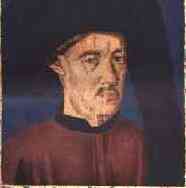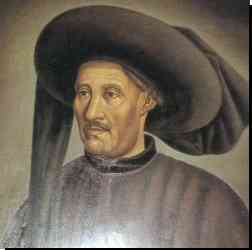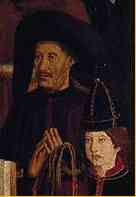


Henry the Navigator
See also http://www.geocities.com/worldcivf2000/henrynavigator/henry.html



Prince Henry, or Dom Henrique, was born in 1394 as one of the six surviving children of John I, king of Portugal and founder of the Aviz dynasty, and Queen Phillippa[1]. Henry was a scholarly youth, as were his four brothers. However, unlike his brothers, Henry took an interest in mathematics and astronomy, rather than philosophy[2]. He possessed a scientific curiosity, seeking to discover unknown lands and aspiring to reveal the mysteries of the earth. He also had a passion for warfare[3]. Prince Henry and his brothers sought to earn knightly honor, but were unable to win their spurs in battle because of a non-agression treaty with Castile, signed in 1411 by King John the I, which was to last for one hundred and one years[4]. King John I proposed that his sons win knightly honor through a jousting tournament, sponsored by Portugal, which would include the participation of the best knights in Europe. The princes refused the proposal, believing only battle would bestow greatness upon a knight. The princes began to devise a plan to win their spurs during a time of peace with the Castilians. They saw Ceuta as an opportunity[5]. In 1415 Prince Henry and his brothers lead the Portuguese army to Ceuta, a Muslim city in Morocco. They conquered Ceuta and converted its people to Christianity[6]. This victory gave knightly honor to Prince Henry and his brothers, except his youngest brother, Prince Fernando, who was only eleven years of age at the time[7]. While in Ceuta, which was a rich caravan city before becoming Christian, Henry learned of the riches in Africa and began to study the geography and trade of western Africa. He decided to travel to these lands were gold, silver, and other riches could be found. In addition to giving Portugal a share of these riches, Henry hoped to travel to Africa to meet Prester John, a Christian king believed to hold a great empire somewhere in the African lands. With the aid of Prester John, Henry could gain a significant victory over the Muslims. His ambition to defeat the Muslims gave Henry the title "Prince Henry the Crusader[8]. The crusade of the Christian states of Spain was transferred to Africa under his leadership[9]. Henry settled in Sagres , located on the southwestern coast of Europe. There he assembled a group of several cartographers, astronomers, geographers, and instrument makers to create more precise maps[10]. The capture of Ceuta also gave the Portuguese more accurate maps. These maps were created by Jews from Majorca who were more free to travel through Moslem North Africa than Christians. Since the Portuguese were denied exploration of Africa by land, Prince Henry decided to encircle the continent, exploring Africa by Sea[11]. In Sagres sailors learned navigatory techniques, and a new type of ship was developed, the caraval, which possessed ideal characteristics for exploring: cargo capability, maneuverability, and seaworthiness.
Ready to begin his voyages of discovery, Prince Henry the Navigator sent ships southward along the west African coast. However, none of his ships would pass Cape Bojador, located south of the Canary Islands. His men feared the sea was too shallow for sailing beyond Cape Bojador and that the currents were too strong for a ship to be able to return. Furthermore, they believed that survival on the land was impossible because of the immense heat generated by the burning sun[12]. In failing to round Cape Bojador, the ships of Prince Henry's first exploration, in 1419, drifted for days because of a lack of wind. By chance the crew sighted an island and named it Porto Santo, meaning "blessed port." Porto Santo was located approximately five hundred miles southwest of Cape St. Vincent and was used for the launching of successive voyages. However, it is questioned whether or not the Portuguese were the first to discover the island, because its location coincides with that of a Genoese map which was estimated to have been created in 1351. On another voyage, which took place between 1419 and 1420, the Portuguese encountered another island named Madeira, meaning "wood." In the fifteen-year period between 1419 and 1434, Prince Henry sent fifteen expeditions to explore the coast of Africa, none of which went beyond Cape Bojador[13]. It was a squire named Gil Eannes who finally succeeded in traveling beyond the Cape in 1435 by sailing westward into the open Atlantic and then turning east to find himself south of Cape Bojador. His voyage alleviated the fear of the other sailors, leading to expeditions reaching farther south. In 1436 an explorer named Alfonso de Baldaya reached Rio de Oro. In 1441 Nuno Tristao and Antao Goncalves reached Cape Blanco, and in 1445 Dinis Dias rounded Cape Verde[14]. Prince Henry did not accompany the mariners on any of the voyages, but he did offer financial support to his explorers[15]. By the time Prince Henry died, in 1460, the Portuguese expeditions had reached Cape Palmas (Liberia). The Portuguese had also established a trading post in Arguim, an island near Cape Verde[16]. The Portuguese possession of Ceuta became worthless as the camel caravans that once traveled to Ceuta as part of the overland trade route began traveling to Tangier, depriving Ceuta of its trading market. In 1436 Prince Henry decided to plan an attack on Tangier to revive Ceuta's market and to give Prince Fernando an opportunity to win his spurs in battle. The Portuguese assault on Tangier in 1437 was a failure[17]. The Portuguese army lacked a sufficient amount of soldiers to overtake the North Africans, who were well prepared for the attack because of Prince Henry's failure to disguise his plan. Prince Henry made three attempts to attack Tangier and failed each time. He finally asked the North African leader, Sala-ben-Sala, for his terms of surrender. The terms included an exchange of hostages- Prince Fernando for one of Sala-ben-Sala's sons-and the Portuguese abandonment of Ceuta. The Portuguese exchanged hostages but refused to abandon Ceuta for Prince Fernando's release, reminding Sala-ben-Sala that they were holding one of his sons. The North African king replied that he had many sons and did not care for the one held hostage by the Portuguese. Since Ceuta was considered to be a significant outpost for Christianity against the infidels, the Pope advised against sacrificing the city for the life of one man. Prince Fernando died four years later while in captivity.
In 1441 an expedition was sent to North Africa to make peace. However, rather than make peace with the North Africans, Prince Henry's troops took ten prisoners, one of whom was Adahu, the chief of an African tribe. The captain decided to return to Sagres with Adahu, because he spoke Arabic, enabling him to communicate with the Bedouin translator. Adahu's knowledge of Africa and the land-based trade routes proved to be advantageous to the Portuguese and their future explorations.
After his triumphs in 1441 and 1442, in which the first natives and gold dust were brought to Europe from the Sahara coast, Prince Henry asked the entire body of Christian sovereigns to aid him in his discovery and conquest. He was refused aid, and Portugal was forced to carry on its crusade alone[18]. A document of Nicolas V. later prohibited the intrusion of all Christians into Prince Henry's discovery and conquest without the permission of the king of Portugal. It also declared that the conquest south of Cape Bojador belonged to Prince Henry[19]. Prince Henry failed to find anyone under the name of Prester John in Africa; however, in 1446 Prince Henry heard that the king of Cape Verde was a Christian. He sent an expedition to the Cape, hoping the Christian king would aid him in the war against the Moors[20]. Prince Henry's contributions included the first sustained expansion outside Europe, which lead to new political, economic, and social contacts. Prince Henry also began many new practices for exploration, such as building on the knowledge of previous expeditions by traveling farther with each voyage and recruiting people of the indigenous population as interpreters. Prince Henry's curiosity and discoveries challenged future explorers to go beyond the knowledge they are given by others[21].
END NOTES
1 "Prince Henry the Navigator" in "European Voyages of Exploration:"
http://www.acs.ucalgary.ca/HIST/tutor/eurvoya/henry1.html
[accessed November 20, 2000].
2 Elaine Sanceau, Henry the Navigator: the Story of a Great Prince and his Times (New York: W. W. Norton & Company, Inc., 1947),
23.
3 Sanceau, 25.
4 Sanceau, 27.
5 "Prince Henry the Navigator" in "European Voyages of Exploration:"
http://www.acs.ucalgary.ca/HIST/tutor/eurvoya/henry1.html
[accessed November 20, 2000].
6 C. Raymond Beazley, "Prince Henry of Portugal and the African Crusade of the Fifteenth Century" in The American Historical Review,
Vol. 16, No. 1. (October, 1910), 13.
7 "Prince Henry the Navigator" in "European Voyages of Exploration:"
www.acs.ucalgary.ca/HIST/tutor/eurvoya/henry1.html
[accessed November 20, 2000].
8 "Henry the Navigator" in "Discoverers Web:" www.win.tue.nl/~engels/discovery/henry.html [accessed November 20, 2000].
9 Beazely, 12.
10 "Henry the Navigator" in "Discoverers Web:"
www.win.tue.nl/~engels/discovery/henry.html
[accessed November 20, 2000].
11 "Prince Henry the Navigator" in "European Voyages of Exploration:"
[accessed November 20, 2000].
12 "Henry the Navigator" in "Discoverers Web:"
http://www.win.tue.nl/~engels/discovery/henry.html
[accessed November 20, 2000].
13 "Prince Henry the Navigator" in "European Voyages of Exploration:"
http://www.acs.ucalgary.ca/HIST/tutor/eurvoya/henry1.html
14 "Henry the Navigator" in "Discoverers Web:"
http://www.win.tue.nl/~engels/discovery/henry.html
[accessed November 20, 2000].
15 W. Nelson Francis, "Hakluyt's Voyages: An Epic of Discovery" in William and Mary's Quarterly, 3rd. Ser., Vol. 12, No. 3. (July, 1955), 449.
16 "Henry the Navigator" in "Discoverers Web:"
http://www.win.tue.nl/~engels/discovery/henry.html
[accessed November 20, 2000].
17 Beazley, 13
18 Beazley, 15
19 C. Raymond Beazley, "Prince Henry of Portugal and His Political, Commercial, and Colonizing Work" in The American Historical Review,
Vol. 17,No. 2. (January, 1912), 256.
20 Beazley, 18
21 "Prince Henry the Navigator" in "European Voyages of Exploration:"
http://www.acs.ucalgary.ca/HIST/tutor/eurvoya/henry1.html
LINKS
http://www.acs.ucalgary.ca/HIST/tutor/eurvoya/henry1.html
http://www.win.tue.nl/~engels/discovery/henry.html
Amanda Farek
For info see Henry the Navigator - 1 and Henry the Navigator - 2